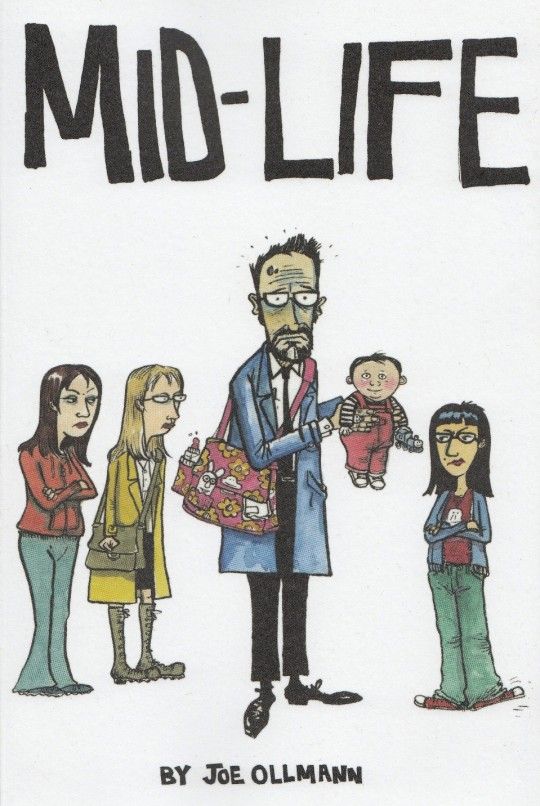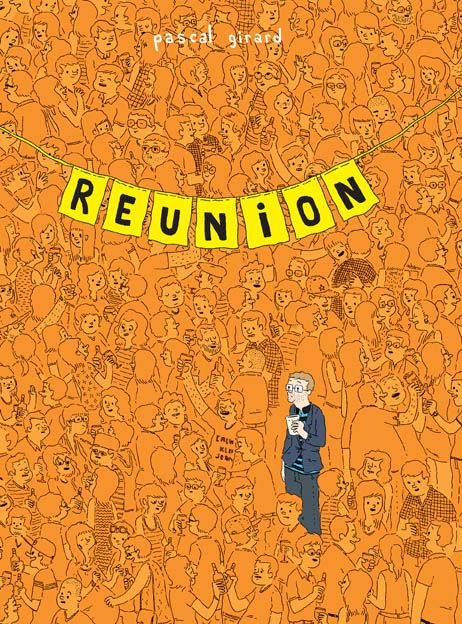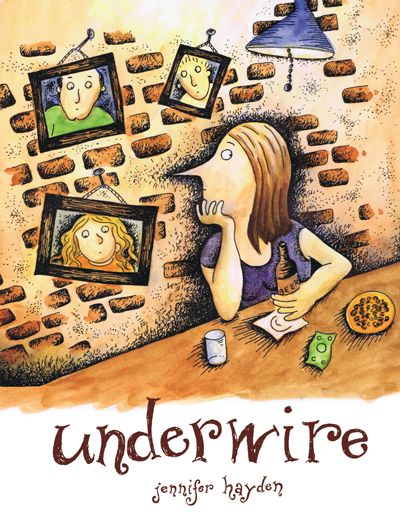There's an inherent risk in using your own life as material for your comics: When a comics creator presents himself or herself as an unlikeable person in a quasi-autobiographical comic, it gets hard to separate the artist from the work. It's sort of a negative aura thing—if the creator looks like a jerk, it's hard to like the comic.
This became blindingly clear to me recently as I happened to read three graphic novels about roughly the same theme—dealing with getting older—in which the attitude of the main character strongly affected my reaction to the story: Joe Ollman's Mid-Life, Pascal Girard's Reunion, and Jennifer Hayden's Underwire. Ollman and Girard both fell into the trap of making their lead characters so obnoxious I never wanted to see them again, while Hayden's character was just the opposite, approaching some serious issues with grace and humor—which probably made me like the book more than I should have.
Mid-Life is the story of John, a guy who is a lot like Ollman—he has two almost-grown daughters from an unhappy first marriage, an infant son from his current marriage, and a day job as creative director for a magazine. Ollman says right up-front in the book that the story is a work of fiction, except where it isn't, and it's pretty obvious (I hope) where the story diverges. He starts off with a bunch of whining about being 40, dealing with sleep deprivation and poopy diapers, his changing body, etc., until I wanted to scream, "Oh honey, stop!" While studies show that most people regard middle age as the best time of their lives, it's also when the real problems begin—your kids become teenagers, your parents get sick and then die, and your own health starts taking alarming turns. John is not dealing with any of these problems; his daughters are well adjusted (although a bit scornful), he has a loving wife and a healthy baby, and his doctors aren't sending him to the hospital for a series of scary tests. On one level, John realizes how lucky he is, but he can't just roll with it. Instead, he wallows in his discontent and then takes a break from self-pity by developing a crush on a children's music performer he has never met.
I hope, for Ollmann's wife's sake, that this is the wholly fictional part of the book. It's also the best part: While John comes off as a whiny, self-centered asshole, the musician, Sherri, is a complex, well-imagined character. Ollman creates a perceptive portrait of a woman in her 20s at a personal and professional crossroads who is wondering which way to go next. When he is sent on assignment to New York, John engineers a meeting with Sherri, although all the while his conscience is telling him, like Jiminy Cricket sitting on his shoulder, that this is a Bad Idea. He rationalizes all the way through it, balancing guilt with the desire to go forward at every step, but his fretting just makes him seem immature. Sherri, meanwhile, is first intrigued, then bewildered, then angry, but she reacts like a grownup, while John is frustratingly childish. I have to admit, the book kept me going with a sort of watching-the-train-wreck fascination as Ollmann brought the story to its final conclusion, but by the end I didn't like John any better and I certainly am not interested in hearing about his next bout of neurosis. Time to man up, son!
Reunion (billed as "semi-autobiographical") is a younger version of the same story: Pascal gets an invitation to his 10th high school reunion and isn't much interested until he gets an e-mail from an old crush asking if he will be there. What follows is downright pathetic: While not admitting it to his live-in girlfriend, Pascal starts fantasizing about meeting the girl, and he starts jogging to lose weight. His frantic preparations for the reunion, and the way his visions of high school are deflated one by one by his old friends and acquaintances, are supposed to be funny, but there's a sourness that runs through the book that makes it hard to laugh. The reunion itself is a cascading series of catastrophes, both physical and emotional, but Pascal mainly comes off as a selfish doofus, disrupting social occasions and annoying the neighbors in pursuit of a fantasy relationship.
While John and Pascal fret about the small frustrations of their lives and construct elaborate fantasy relationships, Jennifer Hayden just rolls with the punches in Underwire. Unlike Ollmann and Girard, Hayden has dealt with real issues, including making the difficult decision to send her son, who has a learning disability, to boarding school (she has also had breast cancer, which is the topic of her next graphic novel). But Hayden doesn't complain; she deals with her sadness and finds joy in the small moments of everyday life.
Underwire has a much slighter feel than the other two, and it's a compilation of short comics rather than a full-blown narrative, but reading it left me wanting more. Like a hippie Erma Bombeck, Hayden drinks and gossips with her friends, lusts after her husband, enjoys her children, and deals with everything from head lice to separation and death with wisdom and humility. While John and Pascal are all about "me, me, me," Hayden takes great pleasure in the people around her, perhaps because, unlike the guys, she has actually dealt with real problems and come out the other side.
It occurs to me in retrospect that there is a gender aspect to this that I can't deny. Both John and Pascal are plotting affairs with other women while their significant others not only remain unaware but are actually supportive of much of what is going on (not realizing where the motivation is coming from). This sort of duplicity would be extremely troublesome in a real relationship, and at least Ollmann acknowledges that (while it makes John feel more guilty, it doesn't make him call off his plans, however). By blurring the line between fiction and reality, the authors make it harder to enjoy the story as pure fiction; I found myself getting indignant on behalf of the women in both books.
A likeble main character is not the same as a compelling story. While Hayden is the one I'd like to have coffee with, her book is really a compilation of strips and sketches. Ollmann wins on storytelling, and despite my irritation with his character, he kept me reading. Reunion is the weakest of the lot, as Girard puts his eponymous main character through a series of comic humiliations but doesn't provide any reward, any flash of insight or moment of fulfillment, at the end. None of the three pushes the medium very far, either. Both Ollmann and Girard stick with straight grids and a sort of ugly/artsy style. Hayden's style is livelier and the images seem to swing from panel to panel, but again, nothing earth-shattering. But there's only one of these creators that I want to spend serious time with in the future.




